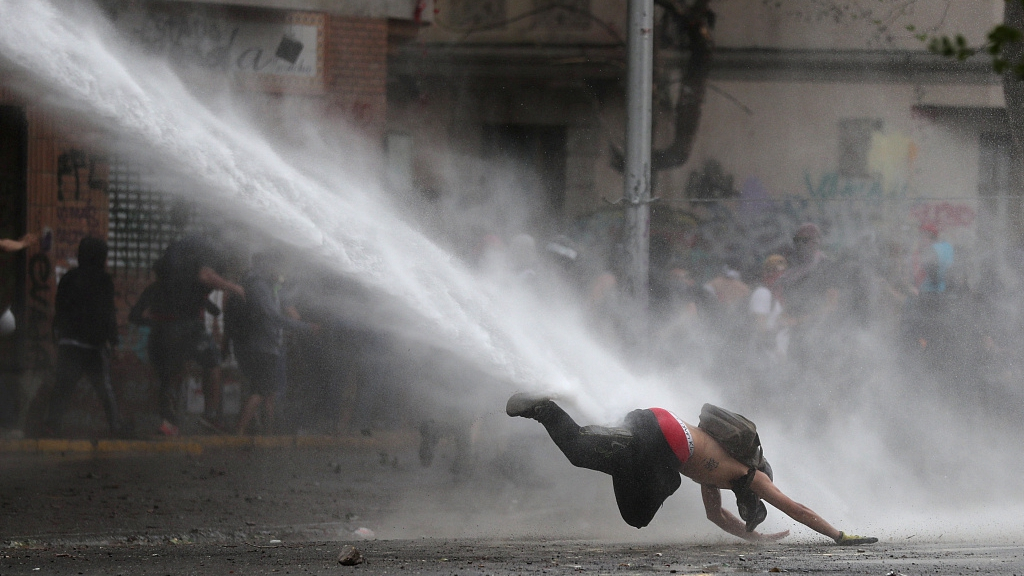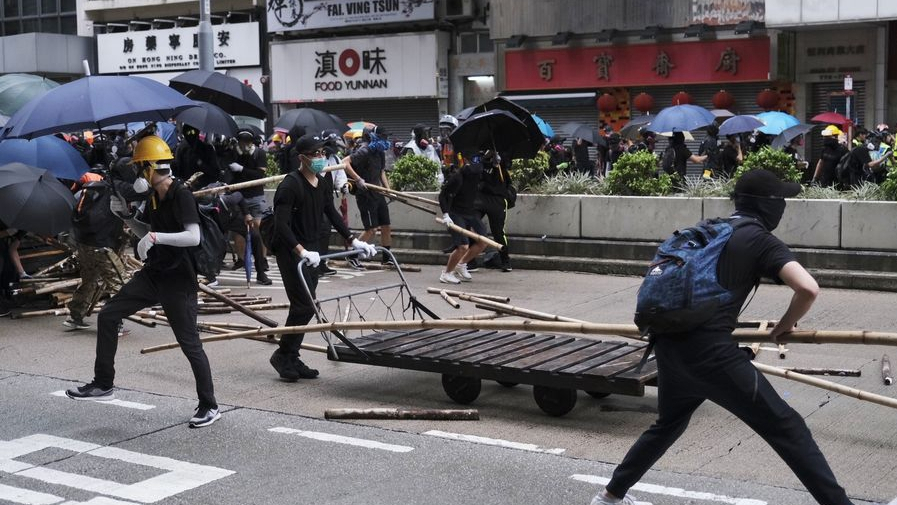
A demonstrator dives to the ground from a water canon during a protest against Chile's government in Santiago, Chile, Nov 11, 2019. /VCG Photo
A demonstrator dives to the ground from a water canon during a protest against Chile's government in Santiago, Chile, Nov 11, 2019. /VCG Photo
Editor's Note: Andrew Korybko is a Moscow-based American political analyst. The article reflects the author's opinions, and not necessarily the views of CGTN.
U.S. Secretary of State Pompeo said on Monday that "We in the Trump administration will continue to support countries trying to prevent Cuba and Venezuela from hijacking those protests and we'll work with legitimate (governments) to prevent protests from morphing into riots and violence that don't reflect the democratic will of the people." This unexpected policy pronouncement is extremely important for several reasons, not least of all because it exposes the U.S. hypocrisy towards Hong Kong's turmoil.
First, it should be pointed out that his extension of vague support wasn't made in response to any public request thereof, which strongly suggests that the U.S. is still acting upon its historic hegemonic intentions towards the region. In connection to this, he's reported by Reuters to have singled out U.S.-aligned governments such as the ones in post-Morales Bolivia, Chile, Colombia, and Ecuador, demonstrating that the U.S. is at the very least carrying out a partisan political intervention into their domestic affairs in order to preserve its interests.
The Latin American countries have been divided between left-wing and right-wing forces since their independence in the early 19th century. So, there's nothing new about the frictions between these two once again rising to the surface of society in the present day.
The U.S., however, has always viewed left-wing forces as a threat to its economic interests. Therefore the U.S. sought to delegitimize them, hence why Pompeo accused the socialist governments of Cuba and Venezuela of supposedly "hijacking" the latest protests into riots.
What's important here isn't the lack of facts to back up his scandalous assertion, but to draw attention to the U.S.' acknowledgement that foreign forces might sometimes have an interest in "hijacking" protests and "morphing (them) into riots and violence that don't reflect the democratic will of the people."
This is what China has been saying all along about Hong Kong's unrest, where the radical domestic forces in the city have conspired with foreign forces to hijack the protests over there.

Rioters block roads, attack bystanders and vandalize public and private facilities in Kowloon, Hong Kong, China, October 6, 2019. /Xinhua Photo
Rioters block roads, attack bystanders and vandalize public and private facilities in Kowloon, Hong Kong, China, October 6, 2019. /Xinhua Photo
Nevertheless, American media have relentlessly mocked China's claims as a "conspiracy theory" to discredit China while bestowing "legitimacy" to the violent protesters against the city's law enforcement. But as a matter of fact, these sorts of provocations are never tolerated in the U.S.
There are notable differences between the societies of Latin America and Hong Kong. But it is what's behind the scene, reflecting that Pompeo is playing narrative games, whereas China is telling the truth.
Unlike Latin America, there is no history of tense partisanship within Hong Kong, which never "broke away" from China but was forcibly occupied by the British Empire after the First Opium War.
Whereas the left-right divisions within Latin American society are naturally occurring (even though many right-wing forces have been historically supported by the U.S.), the residents of Hong Kong have never violently agitated against their fellow Chinese whose civilization they share and with whom they lived together for millennia prior to colonization.
Pompeo's hypocrisy is that he supports as a matter of official policy much less credible claims about foreign forces "hijacking" protests in some U.S.-aligned Latin American countries yet rejects the comparatively more credible claims openly made by the Chinese government itself concerning the foreign political, media, and on-the-ground forces that have been proven to have hijacked protests in Hong Kong.
China has asked these same foreign forces to stop meddling in its internal affairs but has regularly been rebuffed, yet the countries that Pompeo reportedly listed off haven't made any official request for the vague U.S. support that he promised to counteract what he regards as essentially the same type of threats.
The U.S.' double standards are self-evident. They're that the U.S. will overreact to comparatively less credible claims by its regional partners while rejecting the much more credible ones by countries that it considers to be competitors.
(If you want to contribute and have specific expertise, please contact us at opinions@cgtn.com.)